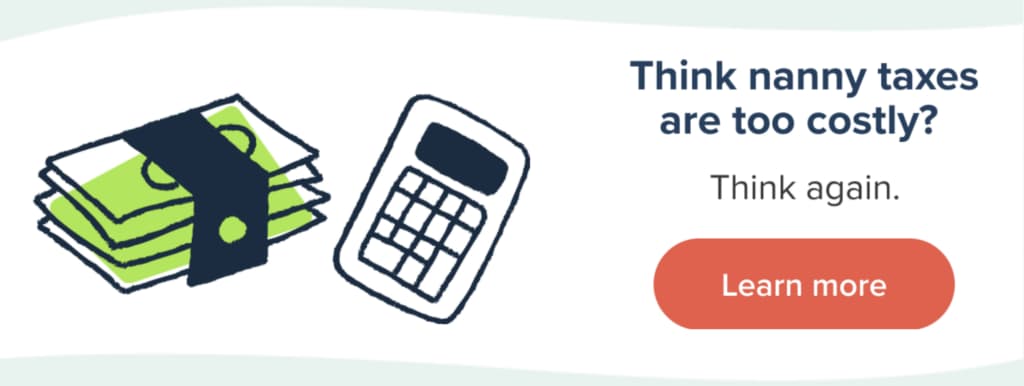When families hire a nanny, in-home senior caregiver or other household employee and pay them at least $2,700 during the calendar year, they have tax responsibilities. Part of those responsibilities are sending the IRS estimated tax payments at various times of the year. You may have heard of estimated tax payments or the 1040-ES schedule before, but it’s an important part of being a household employer and you should familiarize yourself with what this process entails.
What are estimated tax payments?
Every taxpayer has a certain amount of taxes that they’ll owe to the IRS every year. Some people choose to pay them all at once when they file their personal income tax return, but some choose to make estimated tax payments throughout the year that will all add up to approximately what they’ll owe.
Are estimated tax payments required because I’m a household employer?
There is no law requiring you to make estimated tax payments, but the IRS recommends it for anyone who will have a large tax liability to avoid having an underpayment penalty. As a household employer, the taxes you’ll owe will be included with your personal income taxes, so it’s highly likely that you’ll have enough tax liability to where you’ll need to make estimated tax payments. We take the conservative approach at HomePay and require our clients to adhere to the estimated tax payment schedule, but this doesn’t result in you owing any additional fees or taxes.
How often will I have to make estimated tax payments?
The IRS has four scheduled payments that coincide with the following timeline:
1040-ES#1 – made in April for taxes you’ve accumulated in January, February and March.
1040-ES#2 – made in June for taxes you’ve accumulated in April and May.
1040-ES#3 – made in September for taxes you’ve accumulated in June, July and August.
1040-ES#4 – made in January of the next year for taxes you’ve accumulated in September, October, November and December.
Why is my January payment significantly higher than other tax collection periods?
This is due to the IRS making the fourth estimated tax payment encompass four months worth of household employment activity. Unlike businesses that pay quarterly taxes using Forms 940 or 941, household employers like yourself follow the IRS’ 1040-ES schedule instead, which is slightly different and uses a Schedule H at the end of the year to reconcile your tax activity.
What taxes are included with my estimated tax payments?
As the IRS is a federal tax entity, your estimated tax payments will include only your federal household employment taxes. Those taxes are:
The Social Security, Medicare and federal income taxes withheld from your employee.
The Social Security, Medicare and federal unemployment taxes you owe as a household employer.
Keep in mind that HomePay will only collect household employment taxes from you. Any other taxes you owe from your job or other activities are your responsibility to manage.
What does the IRS do with the estimated tax payments sent in?
The IRS will apply those payments to the total amount of taxes you owe throughout the year. Since you’ll have to include your Social Security number on your estimated tax payments, they’ll be able to identify those payments when you send in your personal income tax return and Schedule H. This is important because the Schedule H will show the total household employment taxes you owe for the year, but will not show how much of those taxes you’ve already paid.
We understand this may be your first time dealing with this subject, so hopefully you feel more comfortable with what estimated taxes are and why they’re important. As a HomePay client, we hold your hand through the process by notifying you in advance of when taxes will be collected, how much in taxes you’ll owe and then sending the correct amount of taxes to the IRS on your behalf. If you have additional questions about this topic, please reach out at (888) 273-3356 and we’ll be happy to talk to you about it.
Next Steps:

